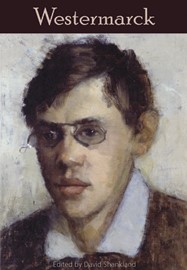
Westermarck
Edited by David Shankland
Occasional Paper No. 44 of the Royal Anthropological Institute. Published in association with the Anglo-Finnish Society.
Westermarck was a remarkable man, but one who has received little credit for the significant part he played in the creation of modern anthropology. He spanned two worlds: the comparative anthropological endeavours of the nineteenth century, and the establishment of social anthropology at the LSE, in which he played a major role. One of Malinowski’s principal teachers, he was himself an outstanding fieldworker. His work on Morocco has, even today, hardly been surpassed. Yet, his theories on the nature of human marriage and the origins of the incest taboo place him firmly in the earlier, generalist camp, and the controversies to which they have given rise have hardly settled down to this day. In this volume, Westermarck’s place in anthropology is discussed, along with detailed descriptions of his very active academic life in Finland and in Britain, whilst other chapters consider his equally pioneering writings in morals and ethics. Westermarck’s own writings are featured by way of illustration of his ideas, including his LSE inaugural lecture, his Huxley lecture, and a hitherto unpublished paper on ritual and survivals. This volume shows, indeed, that Westermarck is a ‘missing link’ in today’s history of anthropology, and our understanding of that history will be profoundly changed by a better appreciation of his role within it.
CONTENTS:Foreword – Pekka Huhtaniemi, Finnish Ambassador in London; Acknowledgements; Key dates in Westermarck’s public life; Introduction: Westermarck: A missing link – David Shankland; PART I – ON WESTERMARCK: Chapter 1: Westermarck, anthropology and the Royal Anthropological Institute – David Shankland; Chapter 2: Edward Westermarck at the Academy of Åbo, 1918-32 – Olli Lagerspetz and Kirsti Suolinna; Chapter 3: Edward Westermarck as a Finnish patriot abroad – Pekka Rantanen; Chapter 4: Carl Starcke and Wilhelm Bolin on Edward Westermarck’s dissertation, The History of Human Marriage: The question of plagiarism – Juhani Ihanus; Securing language in a multilingual world; Chapter 5: Westermarck and the Westermarck Hypothesis – Arthur P. Wolf; Chapter 6: Westermarck might have been both right and wrong: A comment on Arthur P. Wolf’s chapter – Jan Antfolk; Chapter 7: Looking backwards and forwards – Timothy Stroup: Chapter 8: Westermarck’s theory of morality in his and our time: A perspective from the LSE anthropology department – Maurice Bloch; Chapter 9: The relativity of Westermarck’s moral relativism -Camilla Kronqvist; PART II – BY WESTERMARCK: Chapter 10: Implications of the theory of selection (1889, edited and translated by Jan Antfolk); Chapter 11: Sociology as a university study (Inaugural lecture as Martin White Professor in Sociology, 1908); Chapter 12: Survival in ritual (Delivered to the International Congress of Ethnological and Anthropological Sciences, 1934); Chapter 13: Methods in social anthropology (Huxley Memorial Lecture, 1936); Index.
David Shankland is Director of the Royal Anthropological Institute, and Reader in Anthropology at the University of Bristol. Amongst his specialist areas of study are the history of anthropology, particularly disciplinary diversity and the emergence of Social Anthropology in the twentieth century.
Hardback, ISBN 978-1-907774-31-7, £55.00 (GBP), $95.00 (USD)

